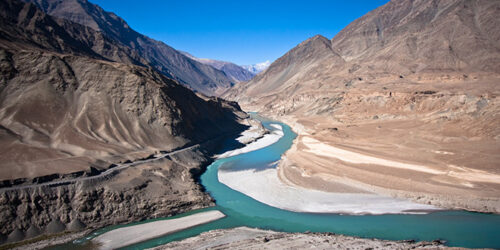Pakistan is not very rich in natural resources and endowments but very poor in managing whatever it has and even poorer in recognising the potential of such resources and (mis) use by others.
Fresh water and data are two prime examples in this case.
Let us start with the fresh water. A country that was once blessed with abundant fresh water supply, essentially through river systems, is losing it quickly through three “I”s; ie India (for manipulating the Indus Waters Treaty), indecision (on dams and reservoirs), and inaction (to mitigate and adapt to climate change).
The country may face “absolute scarcity” of water very soon – some projections are for the year 2025.
Per capita availability of fresh water in Pakistan has gone down from 1,165 cubic metres per person in 1965 to 265 cubic metres per person in 2017 (the latest verifiable data), and certainly would have reduced further at present.
Pakistan is the fourth largest consumer of fresh water in the world, while the agriculture sector is the largest consumer of it.
For the agriculture sector, while the country has a reasonable irrigation system, the on-farm water management is still under-developed and contributes the most to the fresh water loss.
Despite spending billions over the years, the water management has not improved sufficiently, probably due to the fact that farmers do not care about the “price” of available water.
Is it really priced, let alone based on economic value? Moreover, is the water supplied to consumers, especially urban, priced adequately? Isn’t it time to think about it?
Yes, this could be one of the toughest political decisions and carry a lot of social and rural livelihood implications. However, this price of water could be offset by subsidising farmers through diverting other inefficient subsidies.
The idea is not to burden the farmers or consumers of agricultural products, rather institutionalising the real value of fresh water and inducing the efficient use of it, especially in agriculture, through pricing adequately.
Moving on to the data, this is yet another resource that is being accumulated rapidly but is being exploited by others even more rapidly – (see the article “Use of big data is a missed opportunity in Pakistan”).
The big tech giants, none of which is Pakistani, are enjoying free access to mines of data that is being generated in Pakistan every day.
Data protection is a term that one hears often in policymaking circles but unfortunately it is limited only to data privacy and not data ownership and use.
Someone has to recognise that every bit of the data that is generated in Pakistan must be owned by the country and any revenue associated with such data must be shared accordingly.
From a different perspective, even if the data market is free, are we using that data, particularly the Big Data, for better governance through well-informed decision-making? Not heard of it yet, despite the slogans of “Digital Pakistan”.
There should be a strategic decision and a set of enabling policy tools to recognise, own, value and use the data in Pakistan.
Yes, this may also be a politically tough decision, as apparently the business environment for information technology and communication operators/businesses would become hard.
Not exactly! The idea is not to stop them from using such data but only to recognise the ownership where it belongs and adopt fair use and benefit-sharing approaches.
“Data is the new oil” is a cliché but it is only if the data is in your hands, it is “burnt” quicker than the oil.





